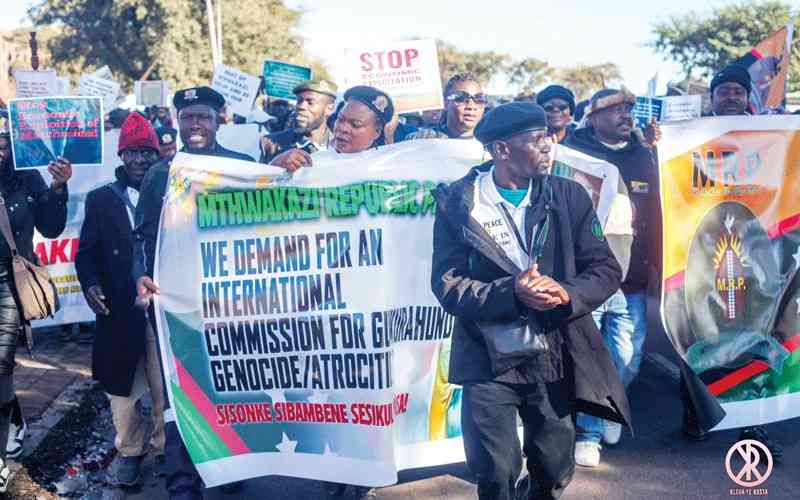
The current state of Zimbabwe’s economy does not make any sense and similarly, most Zimbabweans do not make enough cents for their sustenance.
For the past 15 years, Zimbabwe’s economic performance has been consistent in its nature and degree of perversion.
It is not disputed that President Robert Mugabe’s government ruined the economy through diligent pursuance of unsound economic principles.

The country reached a cul-de-sac of economic despair, a point where things could not get worse because the worst had already been reached.
The economy hit unprecedented levels of decline to render all known terms of describing economic failure inadequate.
The travesty resulted in the country’s currency plunging to oblivion.
Currently, the country has no local currency to boast of and this is an indictment of poor economic strategies.
- Chamisa under fire over US$120K donation
- Mavhunga puts DeMbare into Chibuku quarterfinals
- Pension funds bet on Cabora Bassa oilfields
- Councils defy govt fire tender directive
Keep Reading
Of course, the decline hit a point of saturation after the economy had quick-stepped into oblivion.
At saturated point, the economy could not impose further challenges to the people’s already-degraded quality of life.
The troubled people of the economically-doomed nation took to the pastime of staring at the abyss with melancholic apathy.
As if to reward the people for staring at the abyss with sullen eyes, the abyss shot back with its own terrifying stares.
The people had to dig deeper into their retinue of survival skills. The notorious economic decline forced many Zimbabweans to automatically switch to survival mode.
The people had to take precautionary actions to limit the extent of the negative effects of an economy in the doldrums.
In any case, nobody could stand by while death devoured their families in broad daylight.
Some population groups chose to seek economic salvation in foreign lands with unfamiliar cultures. This category of migrants earned the title of economic refugees.
Others chose to squeeze whatever was available from the bowels of the earth just to salvage their emaciated bodies from the savagery of a bad economy.
All of Zimbabwe’s vulnerable majority continue to busy themselves ekeing out a living wherever they are without necessarily solving the economic quandary.
The dying economy divided the nation’s population.
On one side were those who had remained in the country either by choice or by default, and on the other hand, were those who succeeded to go abroad.
Those who remained to face the hardships chastised those who left the country for being cowards, sell-outs and quislings who abandoned ship at the slightest mention of water on board.
In the centre of this crisis was a third force which was moderating the conflict between the victims of strife. he economy, non-existent as it, was that force. The economy chose to maintain some stubborn resistance against getting better.
For a good measure, the economy maintained consistency in slumbering and like all constants, it hardly changed for the better.
Even though the government took the bold step to introduce a multicurrency regime, the economy remained decorated with scars of relentless pummelling.
Naturally, citizens who spend most of their time trying to meet survival requirements hardly get the time to challenge those responsible for their predicament.
People would rather accept the harshness of abject poverty than challenge the demons of economic strife. With time, the fight for economic revival becomes more blurred due to contempt bred by familiarity.
Zimbabweans have acclimatised to the ongoing economic shock and they have lost their guts to fight for the betterment of their miserable lives.
Perturbed outsiders wonder what demon has eaten the people’s zeal to shout for a living economy.
Are Zimbabweans so impervious to the effects of economic mismanagement that they normalise suffering? Is it a matter of Zimbabweans being brought up to respect substandard delivery by those in high position?
Could it be the country’s education system that is tailored to produce lethargic patriots?
Is our behaviour and complicity with evil a sign that Zanu PF has politically emasculated all of us?
Are we not collectively portraying ourselves as oxen in light of our failure to fight for our well-being? Why do we continue to miss glorious opportunities to agitate for meaningful change?
Of course, Zimbabweans have not taken any steps to turn around their economic misfortunes.
Perhaps it is because they are collectively terrified of the unknown consequences.
Maybe Zimbabweans are lazy, irritatingly cautious and stupidly docile as they prefer to remain faithful to their bad fortune and to their tormentors.
The people see not urgency in demanding economic redress from those responsible for butchering the economy as if they jointly signed a memorandum of agreement. The people’s inaction in matters close to the economy, is a foreboding for more misery for future generations.
It is cruel enough for people to suffer the way most Zimbabweans do and it is more than cruel too for the present generation to sow seeds of poverty and strife for generations to come.










